- Home
- Maddie Taylor
The Trail Master's Bride
The Trail Master's Bride Read online
The Trail Master’s Bride
By
Maddie Taylor
Copyright © 2015 by Stormy Night Publications and Maddie Taylor
Copyright © 2015 by Stormy Night Publications and Maddie Taylor
All rights reserved. No part of this book may be reproduced or transmitted in any form or by any means, electronic or mechanical, including photocopying, recording, or by any information storage and retrieval system, without permission in writing from the publisher.
Published by Stormy Night Publications and Design, LLC.
www.StormyNightPublications.com
Taylor, Maddie
The Trail Master’s Bride
Cover Design by Korey Mae Johnson
Images by Period Images, 123RF/Tracy Fox, and Bigstock/Roxana_ro
This book is intended for adults only. Spanking and other sexual activities represented in this book are fantasies only, intended for adults.
Chapter One
Independence, Missouri, 1852
A frigid wind blew across the Missouri River, chapping her cheeks and whipping under the hem of her heavy woolen skirt, billowing it wide and sending a shiver of cold up her spine. Although it was spring, the weather was still unpredictable in late March. A storm had blown in last night, bringing a dusting of snow and icy cold temperatures. Aramina Hobart pulled her heavy coat more snugly around her, trying to block out the frosty air that caused a chill to seep into her bones. She’d had to dig into her trunk to find heavier clothes: her skirt, along with mittens, a scarf, thick socks, and her one pair of quilted drawers, which she’d packed clear down at the bottom expecting warmer, more seasonal weather for this leg of their trip.
It proved that she had no idea what to expect, no matter what the periodicals, newspapers, and books had told her about traveling the Oregon Trail. She quelled the urge to pinch herself as she looked at the long line of covered wagons waiting to cross the river by ferry from Independence into the unorganized territories beyond. For many, it was the jumping-off point to an adventure and a new life. To Mina, it signaled the end of civilization, without trains, telegraphs, shops, or any organized society in general, and the beginning of the danger-fraught, arduous journey that lay ahead.
Thirty in all, each wagon was packed full, weighed down with the supplies each family would need for the trip: cooking tools, furniture, clothing, and some three hundred pounds of food for her and Elliott alone, which would need to last a good while. There were trading posts along the way, though hundreds of miles separated them. There were no guarantees what would happen from one point to the next and they had to be prepared. It had taken her and Elliott two days to amass the bounty that was crammed into every nook and cranny of their wagon. And it still wouldn’t be enough. They would hunt fresh meat along the way, mostly bison, he had explained and, if the rivers allowed, fish.
It boggled her mind. Never had she imagined riding a wagon train west, not this Boston-bred city girl, or having to hunt and forage for food. She was out of her element for certain, used to going to the shops with her sisters, which was the extent of her rustic gathering skills.
As a strong wind gust whipped across the water, she watched as the canvas tops flapped taut, testing the limits of the half-dozen metal bows that arched each wagon bed. Prairie schooners. She’d read the romanticized nickname several times. To Mina’s way of thinking, they looked nothing like the graceful sales of the schooners she’d seen sailing into the Boston Harbor in her youth. These were crudely made, the wagons appearing primitive and rustic, not elegant and stately, as the ocean ships had been when returning from sea.
“Excuse me, Mrs. Hobart.”
She heard the low voice, though it didn’t really register, as lost as she was in her thoughts as well as not being used to being called by her husband’s name.
“Mina!” A familiar, higher-pitched voice barked a second later. She turned and came face to chest with a big, brawny man carrying several large, bulky, string-wrapped parcels in his strong arms. She looked up, way up, into the strikingly handsome face of who she knew from Elliott’s description could only be Weston Carr, the trail guide and master for their journey. His height surely matched his bulk as she craned her neck back to see him. He was over a head taller than herself and twice as broad. With him standing so close, his shoulders and chest were wide enough to block the wind and sun completely.
“For Christ’s sake, Mina, these are heavy.” Her eyes shot behind the man to her husband, who stood glowering at her with impatience. “Either lend a hand or get out of the way.”
She eyed the parcels that Elliott carried, noting it was half the load the stranger carried, then she twisted and peered down the steep dirt path leading down to the dock.
“If you have something smaller,” she offered. “I don’t think I could carry even one of those.”
“Stop being a ninny,” her husband grumbled. “I was jesting. Now, quit blocking the walkway.”
She took a step back onto the frost-covered grass, wetting the bottom of her skirts as she did so. Frowning, she watched as the men passed, Elliott huffing and puffing for breath as he struggled with his burden, unlike the stranger who wasn’t even winded from the task. In fact, as the stranger passed, casting a long shadow over her, Mina noticed he moved easily with a loose-hipped stride, appearing almost graceful as he descended the steep trail. She realized she was staring most rudely when he stopped at the bottom, looked up at her, and winked, his blue eyes snapping with amusement. Mina blushed and quickly looked away, shifting her regard back to her husband.
Being wed to a man she barely knew was still difficult to comprehend. She’d been acquainted with Elliott for years, as they’d encountered each other at socials, parties, and church services, but she didn’t know him, not really, or his true nature. Spending seven days on a train from Boston with him as her near constant traveling companion had been an eye-opening experience, giving her glimpses into the man who Elliott really was. It wasn’t good. She’d like to say that if she’d known then what she knew now, she wouldn’t have married him, yet she couldn’t, having been left few other options and very little choice in the matter.
It had all started two months ago when her father had taken his fourth wife. Yes, twenty-two-year-old Vanessa Boutros, only two years Mina’s senior, was wife number four. Burton Franks had buried two previous wives and much to the shock of friends and family divorced the third—poor barren Alice. He’d further embarrassed his five daughters by marrying his latest wife before the ink had time to dry on his divorce decree from her predecessor.
The nuptials themselves had been a farce. Mina had stood by watching the interminable affair while trying desperately to contain her loathing for both her cold, indifferent father and her greedy new stepmother. Seeing Vanessa simper and preen in her departed mama’s Park Street home while playing her part of hostess as if she’d lived there for years, well, it was enough to make her stomach churn to the point she feared she’d lose the pretentious lobster and crab hors d’oeuvres she was serving.
Vanessa had arrived on the social scene out of nowhere, it seemed. Mina had her pegged as a social climber on first sight. Vanessa’s type was easily recognizable as she clawed her way up the ladder of Boston elite society with whatever means possible. Her fake laugh and risqué dress had been enough to garner her philandering father’s attention, although it was her large breasts and the allure of what he called her childbearing hips that had been like dangling a carrot in front of a famished horse and been all that was needed to bring about a proposal and wedding ring.
“She better produce a male heir to suckle at those enormous teats, posthaste, or we’ll be calling her poor barren Vanessa and attending nupt
ials number five. Mark my words.” This was muttered under the breath of her eldest sister Ruth during the wedding toast while everyone else drank to the happiness of the newly married pair. Everyone except the other Franks daughters, who, like Mina, had looked on the entire affair with undisguised disgust.
All of her sisters loathed their father as much as Mina did. Uninterested in daughters who he was very vocal in stating were useless to him, he’d sired his five girls then practically washed his hands of them. Yes, he provided for their basic needs: shelter, food, and clothes for their backs, but he could have been a stranger passing on the street for all the care and regard he gave them. Over the years, he’d become more cynical and hard to live with as time passed and each subsequent wife failed to do what he declared without reservation to all and sundry was their sole purpose on this earth—bearing him a son. Burton Franks had wealth, power, and connections; however, the one thing he didn’t have, which he wanted more than anything, was a legacy. He desperately wanted a male heir to pass his vast enterprise on to and carry forth the lauded Franks name—in his lofty opinion—into the future.
After the dreadful wedding day, Mina found her life irrevocably altered as Vanessa launched her aggressive campaign to rid herself of her one unwedded stepdaughter of marriageable age. Beginning the very next day, Mina watched as a host of eligible and sometimes inappropriate candidates were paraded before her father. Of course, it wasn’t up to Mina to choose her own husband. That would have been the considerate, loving, and fatherly thing to do.
Burton Franks didn’t exhibit any of those virtues. In fact, Mina was hard pressed to come up with any positive virtues her father possessed. He hadn’t given her three of her four sisters a say, so why should she be different? Ruth had been married off two years prior at the age of nineteen, and their twin half-sisters had been wed last month, only two weeks after their eighteenth birthday. If it weren’t immoral and illegal, Mina would bet her inheritance that her father and Vanessa would have Anna wed without delay. Young Anna would have it worse than any of them. She wouldn’t have a sister’s love and support, as Mina and the others did. Hers would be a lonely existence in the cold Franks household, and she had at least eight years of it ahead of her before suffering the indignity of being bartered off like chattel on the marriage mart. Mina shuddered at the thought of what living under Vanessa’s rule would be like for her sweet little sister.
At twenty, Mina supposed she should consider herself lucky to have not suffered the fate of her sisters already. Unfortunately, convenience more so than luck or generosity was the reason for her father’s prolonged indulgence of her presence in his home. Mina had been allotted more time than the others because she’d played nursemaid, tutor, and governess to his youngest daughter and saved him the trouble of hiring and paying an employee to do exactly that. So, despite his means to provide a host of governesses for his daughter, he got free labor through Mina.
That had changed immediately after Vanessa entered their household. The scene was clear in her head as though it were yesterday. She and her father were going out for the evening. Vanessa, dressed in red satin, which was in line with her usual gaudy style, was pulling on her gloves while she waited in the foyer. She was also practically falling out of her bodice and Mina would have been hard pressed not to notice as she came down the hallway to head upstairs for the evening. As such, her eyes homed in on the neckline of her dress and the ruby necklace she wore, which was her departed mama’s. Stunned—although she shouldn’t have been, considering the man who gave them to Vanessa was her heartless, unfeeling father—she stared, absolutely appalled that this woman was wearing her mother’s treasured jewels.
“Elliott Hobart,” Vanessa started in without preamble when she saw her. It drew Mina out of her stuporous stare, the sickly sweet tone putting her on instant alert. Vanessa was anything but sweet. “Do you know him?”
“From Hobart textiles? I wouldn’t say that I know him, per se, although we have been introduced. He’s the youngest of the three sons, I believe. An acquaintance at best.”
“Yes, yes, that’s him. He is about to set out on an adventure and needs a bride to accompany him. Your name came up and your father made an offer. Isn’t that exciting?”
“He’s twice my age,” Mina gasped, “at the very least.” He was also balding, pock-faced, and had a cordial, though rather off-putting demeanor, as she recalled, having danced with him once and decided it would be the last time—ever. “Papa wouldn’t!”
“I would. Signed the marriage contracts this morning, in fact.” He hadn’t spared her so much as a passing glance as he took his wife’s arm and escorted her out the front door. Mina didn’t miss the self-satisfied grin Vanessa flashed her way or the delighted laughter that floated back to her in their wake.
It took an extreme act of will to keep from running after them and slapping the smile clean off smug Vanessa’s face. She held her temper in check until the door shut behind them, then her fury ignited, flaming as bright as her fiery hair. She’d grabbed the first thing within reach—which happened to be her new stepmama’s treasured vase from the hall table—and watched as it exploded in a thousand pieces against the stout oak front door.
“Mina.”
Her name being called from a distance slowly pulled her from the fog of her memories as her mind’s eye watched the shower of hideous orange and green glass rain down. That the monstrosity of a vase was gone didn’t faze her; in fact, it brought her great satisfaction. She’d hated the gaudy piece since it matched her mama’s tastefully decorated house in no conceivable way. Mina could still see the glimmering glass shards in the lamp light and hear the tiny shattered fragments pinging off the foyer’s tile floor. Her lips tilted into a small smile as she recalled Vanessa’s temper tantrum the next day.
“Aramina!” Her full name this time and the snappish tone made her head come up. Elliott was standing at the bottom of the incline, hands on his hips while glaring at her. He tended to do that a lot. “What in the world is the matter with you today, girl? Get your head out of the clouds. It’s time to pull out.”
Her gaze shifted behind him. The trail master stood tall on the docks directing the first few wagons up the wide wooden ramps onto the ferry. Her stomach rolled as an uneasy feeling swept through her, along with a sense of foreboding. Resigned, she put one booted foot in front of the other and went to join her irritated husband as they began this next leg of their journey, all two thousand miles of it to Oregon Territory and an unknown future.
Chapter Two
Sweat trickled down her spine and between her breasts as the sun beat down upon her. It was quite a change from the frigid cold of only a week ago. The weather had taken an abrupt turn, as had her life, and Mina wasn’t at all happy with the new direction. As a city dweller, she was accustomed to leisurely strolls, not long, arduous marches where she was exposed to the elements for hours on end, and it was taking its toll. When she looked in her small hand mirror each night, the changes were unmistakable. Her lips, once smooth and pink, were now red and cracked from the sun. The complexion that she’d worked hard to keep creamy white, as was the fashion at home, was now a golden brown. A smattering of ugly freckles had developed across the bridge of her nose, the tip of which remained rosy red despite the wide-brimmed bonnet she never went without. Her muscles ached, her feet never stopped throbbing, and with barely a dent out of the grueling trek ahead, her clothing was already loose. Partly from the excessive exercise, the other part due to her abysmal cooking, with Elliott not faring much better. At this rate, she would be nothing but a bag of bones when she limped, or possibly crawled, into Oregon City in late summer.
As if thinking it made it come true, she stepped on a jagged rock and stumbled. She cried out sharply as her ankle buckled and searing pain shot through it. No one seemed to hear or care, however. Lurching forward, Mina grabbed onto the side of the wagon for balance, silently cursing the rocky road and the very existence of the accursed prairie.
/>
With no choice except to continue on, she stepped gingerly, favoring her tender right ankle with a pronounced limp. When the wagon hit an unusually large rut, it creaked loudly, the bonnet swaying wildly as the contents inside clanged and banged about. She exhaled a long, slow breath as her shoulders slumped tiredly, knowing she’d have another mess to clean up when they stopped at day’s end and prayed that nothing essential was broken. She eyed her home for the near future, an eleven-by-four-foot wagon. She’d tried riding at first, but the crude conveyance was a far cry from her father’s well-sprung carriage and the hansom cabs in town. She wasn’t used to being jarred until every tooth in her head ached, the wheels seeming to find every yawning furrow and large rock along the rough path. By midday on the first day, she’d had enough. Every muscle and bone in her body had been screaming in pain when she climbed down from the high seat; she swore even her fingernails and hair hurt.
After that, she walked, from daybreak until almost dusk like everyone else, the exception being the very youngest who rode in the back of the wagons, some toted on their mama’s backs when they lagged behind. Yes, she plodded along just like the others, until that morning, that is, when her aching feet had foolishly prompted her to attempt the rough-hewn wooden bench in front once again. She should have known better, the memory of her battered and bruised behind still fresh in her mind. She hadn’t lasted an hour before she jumped down unaided, wondering how on earth she would endure five, maybe six months of this torture?
Thankfully, the pace was slow, or she wouldn’t have been able to keep up. She learned she had the oxen to thank for that, for it was the valuable cattle that set the speed, not the drovers. Bearing the heaviest burden, the team was allowed to move along methodically, no more than two miles per hour as the team of four—in Elliott and Mina’s case—pulled nearly one thousand pounds of fully loaded wagon. By comparison, their haul was small since it was only the pair of them. The larger families’ wagons were huge, carrying double and triple the amount. The weight of those wagons was staggering, requiring a team numbering at least eight.

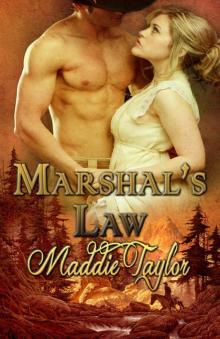 Marshal's Law
Marshal's Law Claimed by the Warlord
Claimed by the Warlord Dare to Love Again
Dare to Love Again Bound by Fate
Bound by Fate Hooked (Decadence Nights Book 1)
Hooked (Decadence Nights Book 1) The Barbarian's Captive
The Barbarian's Captive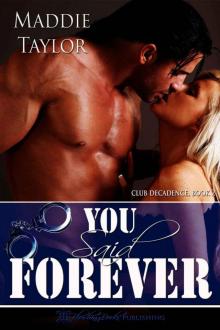 You Said Forever (Club Decadence)
You Said Forever (Club Decadence)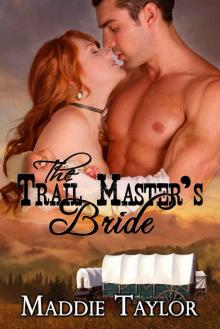 The Trail Master's Bride
The Trail Master's Bride The Renegades' Reward
The Renegades' Reward Wild Wisteria
Wild Wisteria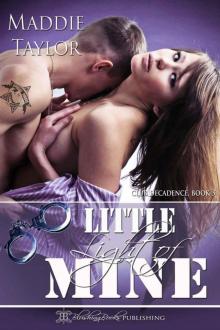 Little Light of Mine (Club Decadence)
Little Light of Mine (Club Decadence) Defying the General (Primarian Mates Book 4)
Defying the General (Primarian Mates Book 4)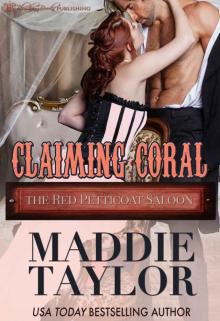 Claiming Coral (The Red Petticoat Saloon)
Claiming Coral (The Red Petticoat Saloon)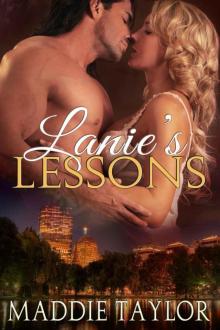 Lanie's Lessons
Lanie's Lessons Innocence Enslaved
Innocence Enslaved His By Command (Primarian Mates Book 2)
His By Command (Primarian Mates Book 2) Second Time Lucky (Club Decadence Book 5)
Second Time Lucky (Club Decadence Book 5) Surrender Your Grace
Surrender Your Grace Sweet Salvation
Sweet Salvation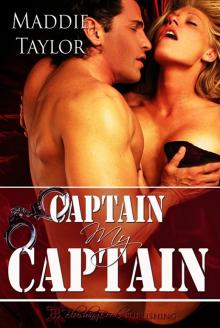 Captain, My Captain
Captain, My Captain Unbind My Heart (Club Decadence)
Unbind My Heart (Club Decadence) His Rebellious Mate (Primarian Mates Book 3)
His Rebellious Mate (Primarian Mates Book 3) French Kiss (Decadence Nights Book 2)
French Kiss (Decadence Nights Book 2) Gideon's Redemption
Gideon's Redemption Defying the General
Defying the General Pleasure Bay
Pleasure Bay What About Love (Club Decadence Book 6)
What About Love (Club Decadence Book 6)